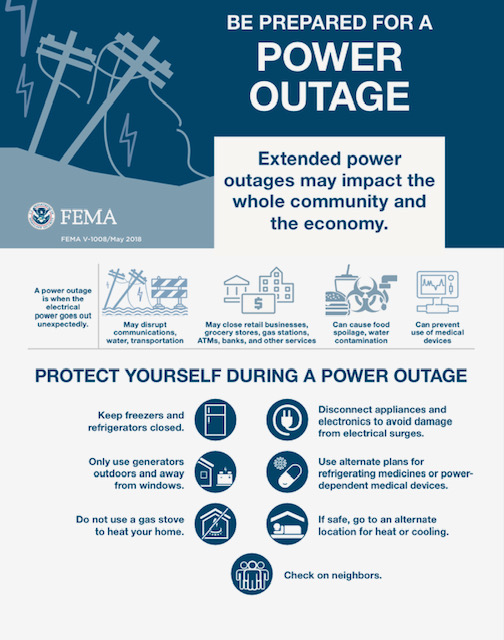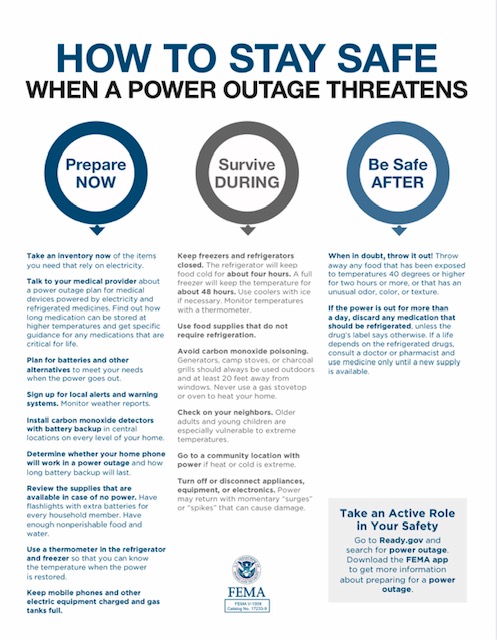Are you prepared for long standing power outages in the event of large storms or other disasters?
Extended power outages may impact the whole community and the economy and can happen unexpectedly at any time.
Prolonged power outages may:
- Disrupt communications, water, and transportation.
- Close retail businesses, grocery stores, gas stations, ATMs, banks, and other services.
- Cause food spoilage and water contamination.
- Prevent use of medical devices.
BEFORE a Power Outage:
- Have a plan for refrigerating medicines or using power-dependent medical devices. If you are not already, please register on the Functional Needs Registry. Be as specific as possible and keep the information up to date. We reference this list anytime there are prolonged periods of power outages. It is important for us to know what or even if you will need assistance if there is no power – and YES, we do call.
- Know what items you rely on and figure out how long you can be without them.
- Have a supply of batteries or back up charging devices to power things that are necessary.
- Sign up for local alerts and warning systems including weather reports.
- Make sure you have Carbon Monoxide alarms with battery back up on every floor of the house.
- Determine if your home phone will work if there is no power and how long (if equipped) the battery back up will last.
- Have enough flashlights for every member of the household.
- Have a supply of nonperishable food and water. Nobody wants to be Hangry in the dark.
- If you know severe weather is coming, make sure your vehicle fuel tank is full.
DURING a Power Outage:
- Keep freezers and refrigerators closed. A full freezer will keep a safe temperature for about 48 hours. A refrigerator will keep food at temperature for about 4 hours. Make sure you have food on hand that does not require refrigeration or cooking.
- Only use generators outdoors and away from windows.
- NEVER use a gas stove or any alternate fuel heater to heat your home.
- Unplug appliances and electronics to avoid damage from electrical surges.
- If it is safe, go to an alternate location for heat or cooling.
- Check on neighbors and family. The elderly and children are more vulnerable to extremes in temperatures.
AFTER a Power Outage:
- Check the temperature of all food in the refrigerator and freezer. If the power has been out for quite some time, bacteria will start to grow above 40 degrees. If there is any question as to the safety of the food, THROW IT AWAY.
- There may still be hazards outside even if power as been restored. Never approached downed power lines.
- Check on neighbors and family.
- Call 911 for emergencies and hazards. Please refrain from calling to report power outages unless you or a household member rely on electricity for medical purposes and need immediate assistance.
- Restock and resupply all your emergency items.
Please do not forget to have a plan for your pets. Storms or other causes of prolonged power outages tend to be stressful times for animals. Please keep close attention to your animals to prevent them from running away or being injured from debris or other hazards outdoors. Ensure you have a supply of dry food, current medical records and photos including Veterinarian contact info and Microchip data if applicable.
Please check out these links for additional resources on Emergency Preparedness
County Animal Response Team (CART) Pet First Aid (App for iPhone and Android available) Ready.gov Albany County Emergency Management NYS Division of Homeland Security and Emergency Services


